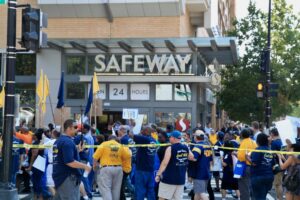The Working Catholic: Mobilizing and Governing
by Bill Droel
The young adult activists who inspired the world this past summer now have the challenge of translating their fervor into practical reform. It is the transition from mobilizing to governance.
The founders of our country were more prepared for the transition to governance than other revolutionaries, argues Hannah Arendt (1906-1975). She compares France to the United States in her classic On Revolution (Penguin, 1963). By the time of their 1787 meeting in Philadelphia, our founders were able to craft a democratic system that endures to this day. Our system, as detailed in our glorious Constitution and in its Bill of Rights and 17 subsequent amendments, is obviously imperfect. It has suffered through rebellions, a Civil War, a tyrannical-like presidency and more. Yet ploddingly and with setbacks, our experiment in democracy inches toward its goal of full liberty and justice for all.
Back in France however, the 1789 revolution was followed by turmoil for a decade and by instability thereafter. Bastille Day was a triumph, but onto the next step the French revolutionaries “had no experience [of governance] to fall back upon, only ideals and principles untested by reality,” says Arendt. The French Revolution was “an intoxication whose chief element was the crowd.” The difference, Arendt concludes, is that the U.S. revolutionaries, in contrast to the French, had the experience of political assembly, long before 1776. Or as John Adams (1735-1826) said: The U.S. Revolution was well underway months and years before Lexington and Concord.
Again, assembly in our 13 North American colonies was imperfect; a right for only some. Black slaves could not initially enjoy that right and women could not vote for or serve in governing bodies. Yet our revolution was not the product of chaos. It was not an accomplishment of solitary heroics urging a rabble forward. For example, Paul Revere (1734-1818) and William Dawes (1745-1799) did not ride as strangers through towns at midnight, randomly knocking on doors. They had advance planning that allowed them to alert small mediating institutions. They knew the leaders of churches and other voluntary associations. Revere himself belonged to five clubs or lodges in the Boston area. Samuel Adams (1722-1803) belonged to the North Caucus, the Long Room Club and others. The same is true for the other founders. In their church committees, lodges, town halls and taverns our founders practiced the arts of governance—deliberation, compromise, balancing interests, public speaking, correspondence and the like.
Outsiders don’t always make for good insiders. Andrew Nagorski in The Birth of Freedom (Simon & Schuster, 1993) examines the monumental movements against communism in Eastern Europe, particularly the 1989 revolt in Poland. He describes the difficulty of transitioning from “dissidents into established politicians.” Lech Walesa’s problems as president were in part related to “the general difficulty of making the psychological switch from the politics of resistance to normal democratic politics,” Nagorski concludes.
The Arab Spring of 2011 was like the revolution in our country in that groups, not solitary individuals, led the way. Yes, Wael Ghonim launched a Facebook page to promote opposition to the Egyptian government. Yes, his and other internet sites helped plan actions. But the leaders came from small groups: lawyers’ circles, engineers’ clubs, the Arab Doctors Union, groups within the Muslim Brotherhood, Coptic churches, trade unions, alumni groups and soccer teams.
The Arab Spring was on the other hand unlike our U.S. revolution. Its leaders did not have prior training in the arts of governance. The young adults involved did use their friendships to temporarily smooth over their religious and ideological differences under the stress of the moment, reports Robin Wright in Rock the Casbah (Simon & Schuster, 2011). However before 2011, they had “limited—and largely unsuccessful—political experience,” she continues. In fact, their prior experience with the government was mostly limited to detention and jail. The Arab Spring was largely over by summer of 2012. External factors, including governments’ use of internet blocking and propaganda plus government counter-force, doomed the promise of the revolt. But internal factors played a major part in the demise, specifically the rebels’ lack of experience in governing.
Choices await the young adult activists in our country. They must decide: Is it better to go it alone; to start fresh? Or is it better to draw upon decades of experience from like-minded reform groups, including some labor locals, some churches, some professional associations, some civic organizations and more? Can our idealistic young adults employ sufficient arts of governing to really implement better policies and institutions?
Droel edits INITIATIVES (PO Box 291102, Chicago, IL 60629), a printed newsletter on faith and work.

